When writing a review, you’ll name-drop the game in question multiple times. If the title is less than catchy, you’ll abbreviate. For example, I’ll happily review “Fallout”, but wouldn’t touch “World of Warcraft” with a really long pole that’s used for barging. “WoW”, however, is a different story. Anyway, I’m reviewing ArcaniA – Gothic 4, but which is it to be? ArcaniA, or Gothic 4? Right now, you’re probably thinking: “Just pick one, you tedious little man”, but it’s actually a more interesting question than it seems. You see, what we’re dealing with is the first title in the Gothic series not to be developed by Piranha Bytes. On top of that, the new “ArcaniA” prefix is telling of publisher JoWood’s desire to re-launch the series, particularly aiming it at all you non-Gothic-buying Americans out there.
My experience of the previous games is limited. About five years ago I spent forty of the hardest minutes of my life with Gothic 2, which is widely praised for its quality, and renowned for its difficulty. Four years ago, I failed to play Gothic 3 twice, despite valiant attempts to get the bastard thing working. I can –somewhat- happily report that this seems to be the most accessible title of the series, being neither exceptionally difficult nor buggy to the point of unplayable. Given it certainly feels like a new chapter, I suppose “ArcaniA” is more appropriate. Unfortunately, the capitalized A at the end is annoying to type, so I’m just going to call it Gothic 4 anyway…
So, we’re into the third paragraph now, and I’ve just decided what I want to call it. Good. Perhaps I should talk a little about the game now. Yep, I think I’ll do that, ahem: Gothic 4 is a third person action-RPG where you take the role of a predictably “chosen one” who is hell-bent on avenging an equally predictable massacre that occurs at the start of the game. On the way you’ll acquire better armour and gear, alongside specialising in melee combat, marksmanship, or magic. I know what you’re thinking, and you’re right: this is about as traditional an RPG setup as can be. Arguably though, the same can be said for the likes of Diablo and Oblivion. There’s no denying this is familiar ground, so the quality lies in the execution.
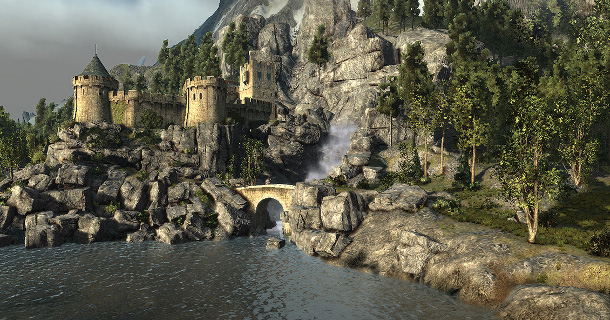
One of the most immediately striking aspects of Gothic 4 is the presentation – for better and worse. For the genre, the game is gorgeous, and this is particularly true of the lush, sprawling sections of countryside. Soil glistens under heavy rainfall. High on the mountains, trees visibly bend, shaking violently in the winds. This culminates in some truly atmospheric sections, and I’m not ashamed to admit jumping at my own shadow on more than two occasions. Where the environmental visuals shine, the character models unfortunately leave more to be desired. Something about the people of Gothic 4 makes them eerily reminiscent of a waxwork – a certain… greased lumpiness. This is particularly true of bald people, but I don’t trust them at the best of times, so I won’t hold that against the game.
Speaking of bizarre visuals, I just have to mention the option of “European” and “American” mode. This seems to be Gothic 4’s directive of drawing in new audiences, manifesting in a truly strange, even condescending fashion. “European” mode offers ‘muted’ colours (‘muted’ being synonymous with ‘real’, apparently) to appeal to us down-trodden Union types; the absence of sparkle comfortably reminiscent of our grey and grim realities. Yanks, however, are in for a real treat – the sickeningly intense colour saturation giving the world an undeniably “Fisher Price” edge. That’s what you Americans like, isn’t it? Bright colours and violence. I doubt you’re even reading anymore, instead frothing at the mouth as you order ten copies while screaming the Pledge of Allegiance – joyful tears running thick and fast.
They’re all gone. We can come out now. So, fellow Euro-Scum, we now come to the audio work – this is really something. For the most part, it’s okay. The soundtrack is typical fantasy – orchestral, forgettable. There are some nice ambient touches in the form of squawks and chirps, helping to breathe life into wooded areas. Still, with a microphone and access to the three square miles of Amazon yet to be cut down, this is no great feat. The voice acting, however, is. I’m serious when I say this – it must have taken great skill to achieve something as monstrously awful as the recorded dialogue of Gothic 4. At absolute best, it wasn’t terrible. At the other end of the scale, well, that’s hard to explain. To try and give you an insight, here’s an excerpt from the notes I took while playing – the part dedicated entirely to dialogue:
“Examples of shit voice acting:
- Suspicious and wholly inappropriate cheeriness,
- hole-in-the-head slowness,
- saying EHHHHH after every other sentence,
- half-Scottish, half-pirate,
- eating-own-cheeks-deranged,
- the bandit battle cry of “HECKLE HIM” – fucking terrifying, that is,
- quest giver delivering all his lines as if reading a story to a troubled child,
- a Transatlantic cast, both sides of the pond having to deal with anglicised dialogue – results in someone more fitting of a cowboy film saying “bloke” and “lad”,
- haughty melodramatic transvestite,
- a castrati
- an Etonian Nazi.”
I admit some of those points make more sense than others, but I wouldn’t want to dilute the raw disgust with explanation. As bad as it may be, though, it does render the game unintentionally hilarious. Not exactly a design compliment, but not quite a turn-off either.
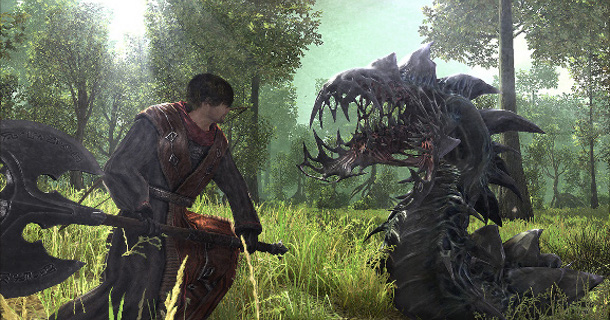
Scrotum-tearingly awful voice work aside, the game actually plays quite well. Melee hits have a nice weight to them, and the kinetic force of wielding a two handed hammer translates well. Being a coward, I specialised entirely in range combat, and the bare-bones of it are strong, if a little simple. The longer you pull back your bowstring, the harder the hit will be – but at the cost of losing some distance between you and the bad guy. Land a hit to the head or neck, and they’ll drop faster. “Drop” is the word. Gothic 4’s physics engine adds -to word it terribly- life to death. A precision shot to the head will send those goblins kissing the ground hard, and there’s nothing more satisfying then taking one out mid-charge. The physics sometimes get a little weird, though: my arrows occasionally sending foes twirling ten feet above the ground. Perhaps that’s just the German interpretation of “Critical Hit”…
Usually, the combat system is a fast paced, enjoyable affair. I have fond memories of stalking the long grass of jungle areas, and picking off a wild beast before being chased away by the pack I failed to notice. There are a number of irritations, however. For a start, the same button that blocks also sends you into a roll, and in the more chaotic encounters it’s easy to dive straight into an arrow as opposed to blocking it. The enemy AI doesn’t help matters either, and in groups I often saw them become stuck on the scenery, or even each other, allowing me to casually shoot them down at near point-blank range.
The biggest annoyance, though, is the difficulty. While I understand the desire to make the series more accessible, it seems things have been taken a little too far. After quickly finding normal mode too easy, I kicked it up to hardest setting and played through the rest of the game very comfortably. Given the Gothic series is known for its strong sense of challenge, I can see this alienating the existing fan base. I watched my beloved Operation Flashpoint butchered in a similar manner, and where I moved onto the ArmA series, they’ve likely migrated to Risen (the new Piranha Bytes project). Part of the issue with difficulty is the lack of balance for ranged characters. I quickly learnt that most enemies simply weren’t fast enough to hit me, as long as I was on the move. Fights soon degenerated into nothing but a brisk backwards walk, the only real danger being corners. Another problem is the healing system. You see, both food and potions can replenish health, and neither have cool-downs in combat. While it’s rather amusing to see yourself running in a panicked circle, shovelling apples into your face to mend that stab wound, the challenge is killed off completely.
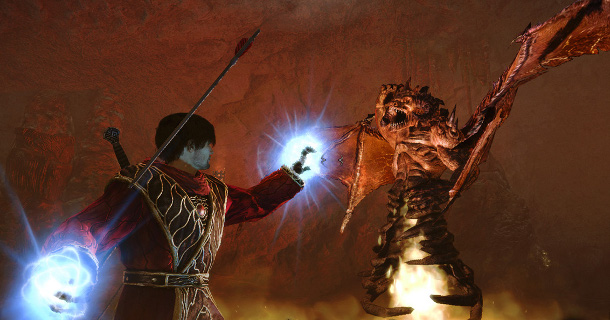
Though combat and questing make up the bulk of Gothic 4, I feel the need to mention the little side activities, as they’re rather well implemented. The crafting system allows meat to be cooked, ore to be mined, potions mixed and so forth. You can even set your arrows on fire. While nothing new, the system requires little commitment – you don’t need to specialise or spend experience points, instead simply buying and acquiring recipes along the way. It’s simplistic, but it works. In games like the Elder Scrolls series, I was always put off potion making by the requirement of an encyclopaedic knowledge of fictional herbs. With Gothic, a spade is a spade – you pick ‘healing plants’, and use them to make ‘healing potions’. How strangely innovative… A niggle with all this, though, is that no apparatus is ever required. You simply open the menu and click. Unless my guy was hiding a couple of anvils, a hammer, and a roaring fire down his trousers, there’s no sense of interaction with the game world – which leads onto my next point:
The game world is shit. Don’t get me wrong, there’s some great presentation work here, and a few fairly original sights – a giant hollowed-out tree full of mages comes to mind. The problem is that, in terms of design, there’s an overriding sense of confusion as to what this game actually wants to be. In cramped dungeons, it makes perfect sense – this is hack and slash, fireballs are being hurled at you, and you want to get to the end because there lays treasure. Unfortunately, Gothic 4 likes to throw you into relatively huge expanses. This feels rather deceiving, in that such environments are usually found in more free-roaming titles. Gothic, however, is driven by incredibly linear quest lines with little in the way of side-distractions. There are towns to explore, but you’ll do little besides sell your loot and pick up the next quest. Villagers don’t even react to you picking their locks and pilfering their possessions. It’s big, and it’s empty.
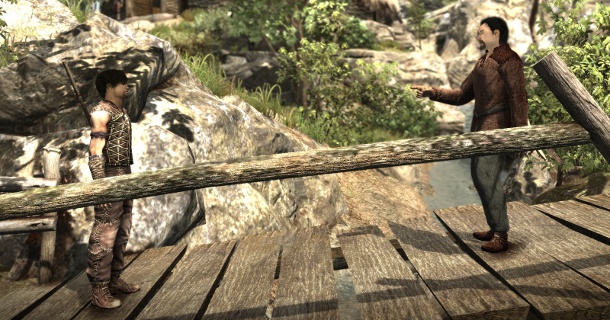
This same hollow feeling permeates the dialogue. My only theory as to why there are dialogue trees at all is to ensure the player is still awake. It’s a very rare occasion in Gothic 4 when more than one speech option progresses the quest line, so usually it boils down to just hammering the top choice until you’re killing things again. This lack of choice lead to a strange resentment of my character – as time went on, everything he said became more rude and aggressive, and at times he just appeared to be difficult for the sake of it:
“Some guy: I need mushrooms for my experiments.”
“Me: Mushrooms? Experiments? What are you saying?”
Maybe his all-consuming arrogance was tied into some intricacy of the story that I missed. You see, while I didn’t feel at a disadvantage for not knowing the story of previous games, I still had great difficulty following it. The various people you encounter along the way appear so briefly, with little in the way of strong characterization. This left me forgetting who seemingly key individuals were, and during the end quarter, I watched as my character greeted apparent strangers as if they’d grown up together. Things felt a lot more enjoyable when I simply tuned out of the disjointed mess.
As I write this, I can’t help but feel the game sounds a lot worse than it actually is. It almost defies common sense, but for the most part I actually enjoyed my many hours with Gothic 4. All the issues I’ve raised are present, and it’s not my intention to exaggerate them. Still, though, there’s something fairly compulsive about the experience, and the more I think about it, the more a comparison develops: Gothic 4 is a single player MMO. Like Guild Wars, the environments are gorgeous, but if you zoom out far enough on the map, and trace your progress from start to finish, it’s little more than a huge and winding corridor. You’ll pick up everything you see, selling most of it to a faceless trader – the acquisition of more gold leading to that vaguely satisfying tingle. Like WoW, I found myself burning out after a few hours, instead tackling it in chunks. The same sense of up-hill, long-term progression through gradual gear improvement and levelling is here, all without a subscription fee.
To a lot of you, that probably doesn’t come across as a compliment, but I think it’s what had me coming back. Given Gothic 4 can be compared to an MMO, it will probably come as no surprise to hear that it’s grindy as can be. The story is constantly road-blocked by people wanting favours in the form of five of this or ten of that. What was absolutely fascinating, though, was that my character seemed just as frustrated as I was.
“Let me guess, it’s time for checking wreckage and fighting, right?” he once wearily moaned.
Close to the end, his impatience was tangible, and it seemed like he was shouting through the dialogue in order to gain details of the next mindless task. I made sure to note down this particular out-burst:
“Oh no, I’ve got no time to run errands!”
When the character themselves is moaning about the repetitive quests, something is most definitely wrong…
So, taking it all into account Gothic 4 is a repetitive, sometimes buggy grind-fest driven by a story that’s both familiar and forgettable. Yes, this is my view of it, but I can’t seem to do the rational thing and tell you to stay the fuck away. You see, for all its faults, Gothic 4 has this shoddy charm that can really appeal to your forgiving side. In the right situations, the combat can be a good laugh, and I’m half-tempted to spend a few more hours messing around with a melee character. In an understated way, I felt the visuals were actually rather brilliant. The best bit, though, has to be value for money. We’re living in an age where six hours is an acceptable run time for a 40 quid game. On Steam, Gothic is currently 30, and it took me a respectable 21 hours to complete.
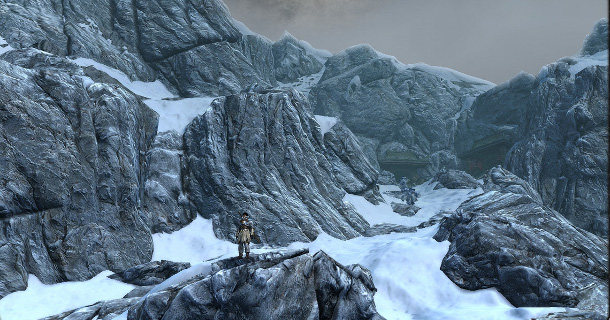
While I won’t call it a must-have purchase, Gothic 4 is a solid action RPG that should appeal to fans of the genre. If you want a lengthy experience, and don’t fancy heading online, then it certainly wouldn’t hurt to at least try out the demo.


